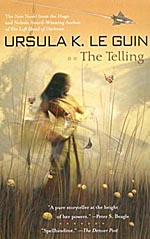
![]() Rhondak101
Rhondak101
3/1/2014
![]()
The Telling (2000) is Ursula K. Le Guin's eighth (and currently last) novel in the Hainish series. It won the 2001 Locus SF Award. I recently read a 2013 interview with Le Guin in which she says "Maybe, as I've gone on, what I've learned as a writer is that you do as little as possible. And part of it is leaving a lot of it up to the reader. And a lot of it is realizing you don't have to do that much if you do the right thing. That's enough. So my writing has tended to be shorter and more allusive than it used to be."
Le Guin follows her own advice in The Telling. In this age of enormous page counts and authors who are now "too famous" to be edited, the hardback edition of her book is 264 pages (with a nice, big font and very comfortable margins). In many ways this book reads like an Eastern koan: Le Guin never explains; she never tells the reader what to think. She presents contrasting ideas in beautiful language and lets the reader decide what it all means.
The contrasting ideas in this book deal mostly with religion. The protagonist Sutty is an Observer for the Ekumen. Sutty lives on an Earth in the far future which has become a totalitarian theocracy. She is culturally Hindu, from the Indian subcontinent, and a lesbian. Each of these makes her a target of the ruling Unists, who seem to be a fundamentalist sect but Le Guin never defines their beliefs.
On Earth, Sutty studies to go to the planet Aka. She learns the language and the culture, but by the time Sutty arrives via a ftl-ship, the culture she learned about and the language she learned have been destroyed. In the old culture's place is a totalitarian uber-capitalist culture, that closely monitors the lives and habits of its "producer-consumers." Audio advertising is blared through speakers in all public places. Books and religion are banned. Sutty believes she is one of the few people on the planet who can still read the old language.
Sutty's life is monotonous because almost every vestige of the culture she came to study has disappeared. She searches the state-controlled library for any document that has not been produced by the new regime, anything that speaks of cultural difference rather than the sanitized sameness that pervades the new culture. That is, until her Envoy (her boss) gains permission for her to leave her closely controlled life in the city and travel to a small village. In the village, Okzat-Ozkat, she discovers that all religion might not be dead. The villagers secretly practice a way of life called the Telling. As Sutty learns about the Telling, she also begins to figure out why the culture of Aka transformed so radically and so quickly.
Le Guin is my favorite world-builder. She creates believable cultures so deftly and so efficiently. Just as she said in the interview "you don't have to do that much if you do the right thing." She did the right thing. You should read this book.